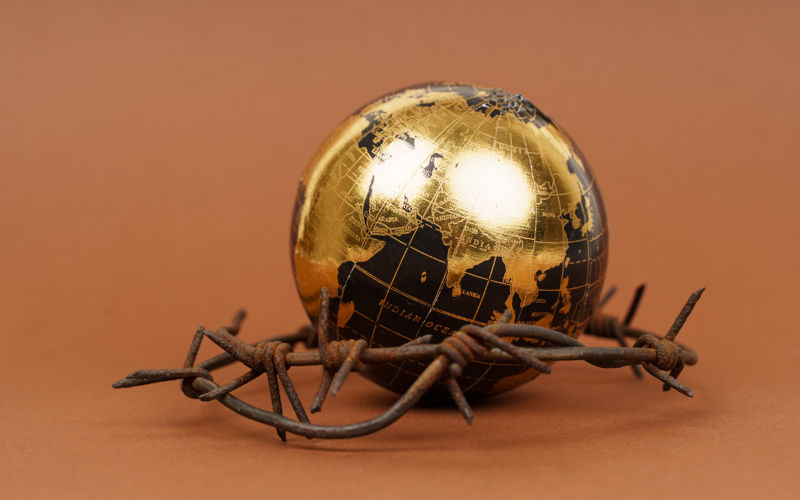What are we to make of what we’re witnessing on our TV screens – the fires, the floods, the storms, the loss of life and habitat? It certainly appears deadly – and monumentally serious. July was the hottest month ever recorded.
Words like crisis and emergency no longer seem to cut it. They fail to capture the enormity of what’s unfolding, and inadvertently promote the questionable idea that somehow, miraculously, we can get through this, that the whole damn mess can be sorted, and if we try hard enough, there might be – if not a return to situation normal – then at least the possibility of a liveable life on earth.
In the same breath, hope is offered up as an existential curative: an emotional lifeline in what feels like suffocating overwhelm. Claire O’Rourke’s Together we Can, Joelle Gerges’s Humanity’s Moment: A Climate Scientist’s Case for Hope, Jane Goodall’s On Hope: A Survival Guide for Trying Times, Solnit and Lunanaut’s Not too late: Changing the Climate Story from Despair to Possibility are just the latest literary offerings in what appears like barely concealed panic. These books invite us to acknowledge the destructive path we’re on, before being told – despite the mounting evidence – that there’s still hope (of what, we might ask? And for whom?).
Calls for urgent global action increasingly rub up against the realities of rising greenhouse gases, global agreements that barely hold the line, and the fact that we’ve already reached and breached several tipping points. Multiplier effects, feedback loops and exponential spikes are now playing out through the biosphere and, according to some scientists, there’s precious little we can do, despite all the techno babble, promises and reassurances.
The full gamut of climate policy madness is revealed in Australia’s schismatic energy policies which are mirrored across the world. There are the usual commitments to “clean energy”, “emissions reductions”, “carbon neutrality”, “zero emissions” on the one hand, and ongoing investment and use of fossil fuels on the other. Go figure.
Meanwhile, back in free-to-air infotainment TV-land, it’s time to do away with all this misery, and focus instead on more edifying matters, like the test series, the NRL, Elvis impersonators, and all things titillating and jolly. News of record temperatures, fires and fatalities are swept aside by contrived hilarity and ceaseless trivia. In the post-Covid, debt-ridden bubble of hyper-precariaty, ‘ordinary people’ might be doing it tough, but then again, demand for flights is back at pre-Covid levels, we still love our luxury SUVs, and house prices are on the rise. Banks and corporations continue to rake in super profits, war economies are booming, and our Donald is in the wings, in court, and waiting to cut a deal with Vlad, and to exonerate himself. At the same time, we’re all flocking to see Oppenheimer as script writers and actors in the US take on Hollywood. The punters seem fond of a good apocalypse story as long as it’s not about climate doom – that’s just way too miserable.
Welcome to the world of the distractive spectacle, a theatre of the absurd otherwise known as cannibal capitalism: a nihilistic system responsible for our neuro biological impairment and the destruction of life on Earth. But wait! We now have another spectacle to entertain us: the wild and whacky worlds of AI and transhumanism. Why bother with all those pesky concerns about loneliness and disconnection when researchers from Google, Microsoft, MIT and Harvard can concoct generative algorithms and dutiful robots. Yes, there’s tremendous scope for human good, despite all the dark sides. We’re reassured that regulation will prevent the worst disruptions to human life, but we might recall how social media has altered just about everything – despite a plethora of regulations. Yet there’s no need for despair, think of how your grandma in a nursing home will benefit from the company of Robert the Robot, or how frustrated males can access custom-designed sex workers. The possibilities are endless.
Yes, it’s really that crazy. Noam Chomsky tells us we face two major existential threats: the climate predicament and nuclear war. He might have added others, not least the destruction of biodiversity, growing inequality, rising authoritarianism, the threat of AI (despite all the attempts to soft-soap it), and the crisis of humanity itself.
The climate/ecological predicament demands of us two main forms of adaptation: deep and practical. The latter is the costliest in money terms since entire economies will have to be reconfigured to cope with environmental destruction, population movements, demands for new infrastructure, and the rest. (The powerful, by the way, already know about the threats posed by traumatised civil societies, and that’s why they’re beefing up the security state in anticipation).
When it comes to talking openly about deep adaptation – or how to live in the midst of catastrophe – well, we’ve barely scratched the surface. Not really. Our love of spectacle and dalliance with hope get in the way.
But there are important examples of what might offer us some solace, comfort, purpose and meaning in dark times. Crucially, custodianship of land, being of service and the building of resilient, cooperative communities are foundational to a survivable future – if there is one. With this in mind, numerous community-based organisations across Australia have sprung up over recent years. Plan C, a non-government organisation based in the Northern Rivers of NSW, offers “community carers and responders” training courses that educate and inspire. Spiritual insight, emotional awareness, reconnecting with others, learning practical skills and undertaking local projects are on the table. I have a vested interest in talking up Plan C as I’m on the board.
If resilient communities offer the best prospect of withstanding what’s to come, at least in the short term, then we’ll need as many carers and respondents as possible.
It’s what each and every hamlet, village, town and city should strive for.
Adjunct Professor, School of Health Sciences and Social Work,
Griffith University (Gold Coast Campus).
Adjunct Professor, Southern Cross University, Faculty of Business, Law and Arts.

